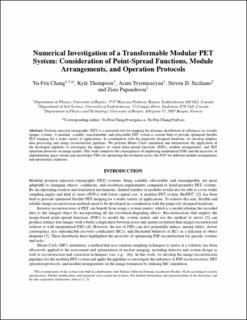Numerical investigation of a transformable modular PET system: Consideration of point-spread functions, module arrangements, and operation protocols
Journal article, Peer reviewed
Accepted version
Permanent lenke
https://hdl.handle.net/11250/2720600Utgivelsesdato
2019Metadata
Vis full innførselSamlinger
Originalversjon
10.1063/1.5114560Sammendrag
Positron emission tomography (PET) is a powerful tool for mapping the dynamic distribution of substances in visually opaque systems. A modular, scalable, transformable, and relocatable PET system is custom built to provide optimized flexible PET imaging for a wider variety of applications. In coordination with the purposely designed hardware, we develop adaptive data processing and image reconstruction pipelines. We perform Monte Carlo simulation and demonstrate the application of the developed pipelines to investigate the impacts of varied point-spread functions (PSFs), module arrangements, and PET operation protocols on image quality. This study manifests the consequences of employing unoptimized PSFs and the necessity of implementing space-variant and anisotropic PSFs for optimizing the resolution across the FOV for different module arrangements and operational conditions.
